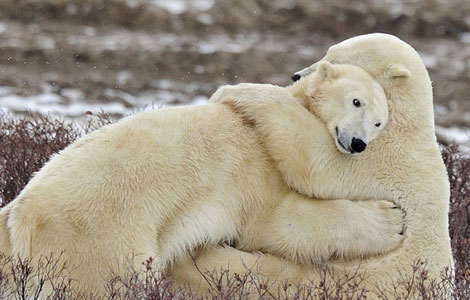NZ criticizes Japan's whaler entering EEZ
Updated: 2014-02-10 17:25
(Agencies)
|
|||||||||||
WELLINGTON- New Zealand sharply criticized Japan on Monday for allowing a whaling ship to enter New Zealand's maritime economic zone.
The government said Japan ignored requests that the Shonan Maru 2 steer clear of New Zealand's 200-nautical mile exclusive economic zone as the whaler pursued an anti-whaling vessel operated by protest group Sea Shepherd.
Japan defended the incident, saying any ship is allowed under international rules to enter an exclusive economic zone, and that it had been necessary to protect Japanese whalers from the activists' protest.
The incident comes during heightened tensions over Japan's whaling. Last week, a different Japanese whaling ship and a second Sea Shepherd boat collided in the icy seas off Antarctica, with both sides blaming each other for the crash.
New Zealand Foreign Minister Murray McCully said Japan's latest actions were "unhelpful, disrespectful and short-sighted" and that Japanese Ambassador Yasuaki Nogawa had been summoned on Monday to meet with a senior official who expressed New Zealand's "deep disappointment."
"The New Zealand Embassy in Tokyo last week made it very clear we did not want members of the Japanese whaling fleet entering our EEZ," McCully said. "New Zealand's strong opposition to Japanese whaling in the Southern Ocean is well known and further action may be taken."
He didn't elaborate on what the action might be.
Japan's chief government spokesman, Yoshihide Suga, said the Japanese ship's entry into New Zealand's EEZ was "part of necessary safety measures that Japan had to take."
"We don't see any problem," he said. Suga also defended Japan's research whaling as legitimate under international rules, and condemned Sea Shepherd's actions as "dangerous and illegal acts" that endanger Japanese crewmembers and their ships.
Glenn Inwood, a spokesman for the Institute of Cetacean Research, which is funded by the Japanese government, said every vessel has a right to enter another country's economic waters, and New Zealand's request for the boat to stay away was not legally enforceable.
He said the Shonan Maru 2 was monitoring the Sea Shepherd protest boat Steve Irwin following harassment near Antarctica.
"It's important for their own safety to know exactly where the Sea Shepherd pirate vessels are at all times," Inwood said.
Speaking by satellite phone from the Steve Irwin, captain Siddharth Chakravarty said his organization abides by the law and is trying to prevent the unwarranted slaughter of whales. He said the Shonan Maru 2 had been tailing their vessel for a week.
Under the provisions of a United Nations treaty signed by more than 160 countries including New Zealand and Japan, each country has certain sovereign rights over their economic zone. Those rights are not as strong as the rights for territorial waters, which extend 12 nautical miles from the shore.
The Southern Hemisphere whaling season typically runs through the end of March.
Related Stories
Japan keeps hunting whales 2014-02-02 15:03
Lessons of history for Japan 2014-02-10 08:02
Heavy snow leads 5 people dead in Japan 2014-02-09 11:44
New Zealand bathtubbing races 2014-02-09 17:07
Fight to save NZ stranded whales underway 2014-01-14 10:25
Today's Top News
Nanjing Massacre is undeniable
China, EU seek more close ties via talks
Lessons of history for Japan
Visit keeps momentum going
Shanghai tops Asia on fashion
Retirement age should be raised
Minimum alcohol price would save UK lives
Spanish princess testifies in corruption probe
Hot Topics
Lunar probe , China growth forecasts, Emission rules get tougher, China seen through 'colored lens', International board,
Editor's Picks

|

|

|

|

|

|





